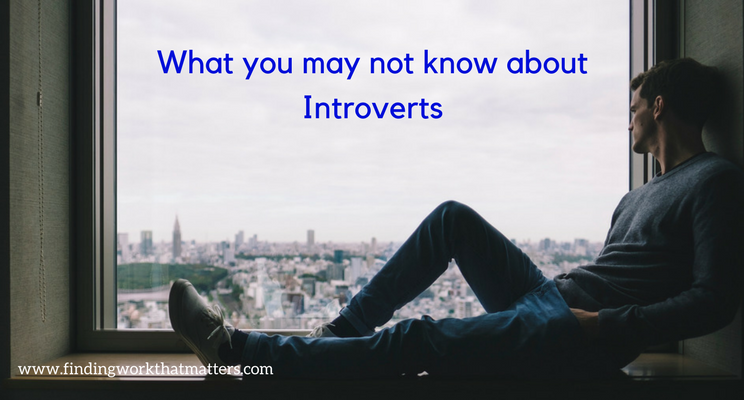What you may not know about Introverts
/The Introverts sat in a row, poised for the question. On the other side of the table, the Extraverts were ready.
“What do you think of Extraverts?”
The Extraverts laughed.
Each of the Introverts was quiet, looking around or at the table in front of them. The pause was lengthy. An Extravert said, “you don’t have to answer.”
One of the Introverts spoke up, “I can answer. I was thinking.”
This exchange is classic between the two personality types. Extraverts wanting to fill in the conversation lapse and Introverts at ease with the lull.
During the quiet, plenty happening for Introverts. When I watch the Introverts closely, I can see they are deep in thought.
Over the years in facilitating Myers-Briggs Type Indicator (MBTI) workshops, the highlight for me is how the opposite preferences engage with one another. It has helped me to understand people in my life and how my impressions have been inaccurate and sometimes totally mistaken.
In my previous blog posting, I highlighted 9 things you may not know about Extraverts and the definition of both.
The question behind the preferences of Extraversion and Introversion is: Where do you get your energy from?
Extraverts get their energy from being outer directed while Introverts are inner directed.
As an Extravert, I am aware of how Introverts have enriched my life. Here’s what I have learned from Introverts:
1. Thinking before talking is a hallmark of an Introvert.
Their preference is to go inward first.
This can be unsettling for Extraverts who are dealing with the outer realm as their first go-to. Extraverts may want an answer quicker than an Introvert is providing.
Introverts can be perceived as not caring or not wanting to talk about an issue.
When you get to know Introverts, those perceptions are far from the truth.
2. Introverts offer a good deal to conversations.
I was once in a relationship with an Introvert. We were having “the” conversation. When I asked him where he thought the relationship was going, he said he didn’t know. Then I asked him where he wanted the relationship to go, and he said he didn’t know.
Later I remembered he identified himself as an Introvert. I had a listing of 30 great questions for couples to help understand each other. I emailed them to him.
He began writing a response to the questions and ended up writing 13 pages in response.
When we got back to the conversation, he had a lot to say on the matter.
Which helped me to understand:
3. Introverts talk just as much as Extraverts.
They just like to think first.
Often Introverts have a lot to say on a matter because of their preference of going deeper into a topic.
I have heard Introverts say they appreciate Extraverts to keep a conversation going.
What is intriguing to many is that:
4. Introverts make great stand-up comedians.
Or anything else where they are doing an activity on their own. This may surprise people as they see Introverts as quiet or wanting to be alone. Introverts have told me that they enjoy doing presentations, where they are in front of a group sharing information. They would prefer not to have interactive components.
One of the key things to remember about Introversion is that it is about how a person gets their energy. Introverts get their energy from being inner directed.
Another way to look at it is:
5. Introverts are not shy.
Shyness is a quality that both Extraverts and Introverts have. Shyness is a response to our environment.
Because Introverts go inside to get energy, I have heard people (probably Extroverts) say that Introverts don’t like doing activities with people but…
6. Introverts are quite fine with doing Extraverted activity.
To a certain degree. Depending on their energy level combined with the Extraverted activity, Introverts can feel energized. They may prefer to put a cap on the amount of socializing time or be with a smaller group.
Typically:
7. Introverts prefer one-on-one interactions or emailing or texting.
This allows them time to consider what the person is saying and how they want to reply. Writing can also be a preferred choice for Introverts.
8. Introverts make great leaders
Because Introverts go inside first, when they speak they have many of their ideas worked out already, allowing them to articulate in deliberate ways. It works well with their ability to think deeply on an issue.
Introverted leaders include: Barack Obama, Albert Einstein, Rosa Parks, Eleanor Roosevelt, Mahatma Gandhi.
Each of these leaders demonstrates the Introverted quality of:
9. Ability to focus
Rather than get involved in chit chat, Introverts prefer to focus on a topic. That ability helps them in preparing for presentations or conversations. They prefer to be purposeful when engaging with others.
Any other thoughts on being Introverted? What do Extraverts need to know about you?
Other blog postings you might like:







